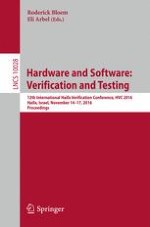2016 | OriginalPaper | Buchkapitel
Improving Priority Promotion for Parity Games
verfasst von : Massimo Benerecetti, Daniele Dell’Erba, Fabio Mogavero
Erschienen in: Hardware and Software: Verification and Testing
Aktivieren Sie unsere intelligente Suche, um passende Fachinhalte oder Patente zu finden.
Wählen Sie Textabschnitte aus um mit Künstlicher Intelligenz passenden Patente zu finden. powered by
Markieren Sie Textabschnitte, um KI-gestützt weitere passende Inhalte zu finden. powered by
